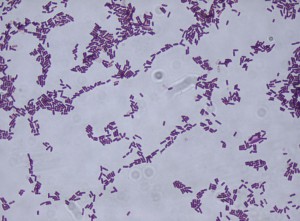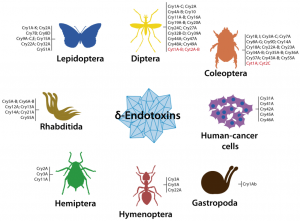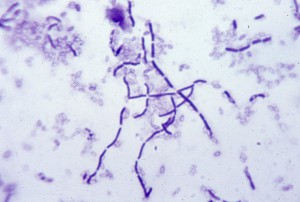 Bacillus is a genus of Gram-positive, rod-shaped (bacillus) bacteria and a member of the phylum Firmicutes. Bacillus species can be obligate aerobes (oxygen reliant), or facultative anaerobes (having the ability to be aerobic or anaerobic). Ubiquitous in nature, Bacillus includes both free-living (nonparasitic) and parasitic pathogenic species. Under stressful environmental conditions, the bacteria can produce oval endospores that are not true ‘spores’, but to which the bacteria can reduce themselves and remain in a dormant state for very long periods.
Bacillus is a genus of Gram-positive, rod-shaped (bacillus) bacteria and a member of the phylum Firmicutes. Bacillus species can be obligate aerobes (oxygen reliant), or facultative anaerobes (having the ability to be aerobic or anaerobic). Ubiquitous in nature, Bacillus includes both free-living (nonparasitic) and parasitic pathogenic species. Under stressful environmental conditions, the bacteria can produce oval endospores that are not true ‘spores’, but to which the bacteria can reduce themselves and remain in a dormant state for very long periods.
Bacillus subtilis, known also as the hay bacillus or grass bacillus, is a Gram-positive, catalase-positive bacterium, found in soil and the gastrointestinal tract of ruminants and humans. A member of the genus Bacillus, B. subtilis is rod-shaped, and can form a tough, protective endospore, allowing it to tolerate extreme environmental conditions. B. subtilis has historically been classified as an obligate aerobe, though evidence exists that it is a facultative aerobe. B. subtilis can divide symmetrically to make two daughter cells (binary fission), or asymmetrically, producing a single endospore that can remain viable for decades and is resistant to unfavourable environmental conditions such as drought, salinity, extreme pH, radiation, and solvents. The endospore is formed at times of nutritional stress, allowing the organism to persist in the environment until conditions become favourable. Prior to the process of sporulation the cells might become motile by producing flagella, take up DNA from the environment, or produce antibiotics. These responses are viewed as attempts to seek out nutrients by seeking a more favourable environment, enabling the cell to make use of new beneficial genetic material or simply by killing of competition. Under stressful conditions, such as nutrient deprivation, B. subtilis undergoes the process of sporulation to ensure the survival of the species.
Bacillus thuringiensis (or Bt) is a Gram-positive, soil-dwelling bacterium, commonly used as a biological pesticide. B. thuringiensis also occurs naturally in the gut of caterpillars of various types of moths and butterflies, as well on leaf surfaces, aquatic environments, animal feces, insect-rich environments, and flour mills and grain-storage facilities. Spores and crystalline insecticidal proteins produced by B. thuringiensis have been used to control insect pests since the 1920s and are often applied as liquid sprays.
Bacillus thuringiensis (Bt) is a Gram positive, spore-forming bacterium that synthesizes parasporal crystalline inclusions containing Cry and Cyt proteins, some of which are toxic against a wide range of insect orders, nematodes and human-cancer cells. These toxins have been successfully used as bioinsecticides against caterpillars, beetles, and flies, including mosquitoes and blackflies. Bt also synthesizes insecticidal proteins during the vegetative growth phase, which are subsequently secreted into the growth medium. These proteins are commonly known as vegetative insecticidal proteins (Vips) and hold insecticidal activity against lepidopteran, coleopteran and some homopteran pests.



